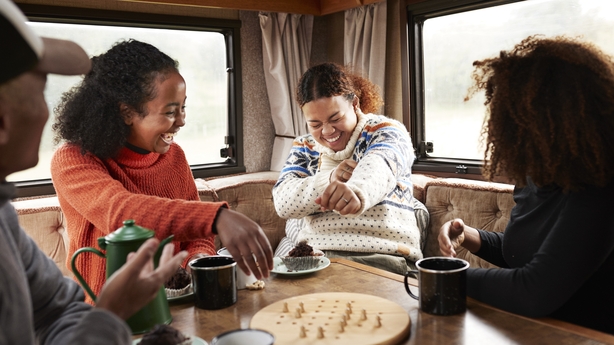Dr. Caroline West is a sex educator and host of the Glow West podcast, which focuses on sex, sexuality and the body. Here she writes about why we should 'spring clean' our relationships, as well as our wardrobes and homes.
Spring is a time of renewal, with longer days and budding plants bringing colour and the promise of change. Each year, we spring clean our houses and wardrobes, hopeful of a fresh start, so why not apply that time-honoured practice to our relationships?
Keeping a relationship feeling fresh and loving takes work, and spring is a good time to revisit what's working and what's not in your relationship.

A relationship spring clean involves reflecting on how your relationship is currently going, and the elements of it that leave you feeling nourished and happy. Conversely, it also involves some potentially uncomfortable reflection on what's not working and why, and what your role is in how the relationship unfolds.
Here are some key areas to start having conversations around:
Priorities
Are you still on the same page as your partner in what you want in the future? Some people want children, marriage, mortgages, others want a childfree life full of travel. What do you as an individual want, and does your partner want the same thing? How can you balance differing wants and needs so that both of you are happy, and what does it mean for your future if you can't agree? These are big questions with big implications for your future, but if you want to live your best authentic life, they are necessary.
Being yourself
Regardless of actions, how do you feel around your partner? Being ourselves is a lot easier said than done, but if we feel comfortable being our real selves around our partners instead of putting on an act, then there is a good emotional foundation between you, which results in a deep intimacy and contentedness.

Stability
Healthy relationships feel soft and exciting, the complete opposite of the wildness of feeling like you are on an out of control on a rollercoaster, not knowing when your next issue is going to appear. If it doesn't feel stable, what next steps will you take?
What's your 'why'?
Sometimes it's easier to stay in a relationship out of habit and convenience, due to the upheaval of a breakup, especially if the couple are cohabiting. There is a housing crisis, after all. But if this is the only reason for staying together, it's going to be miserable.
The hurts we carry
Your own actions are part of this process. We all come to relationships with varying levels of baggage, knowledge, and confidence in communicating. Learning to connect with another human and make that sustainable is a difficult process for many people, but in a healthy relationship there is clear effort to address the gaps and stumbling blocks. It's a team effort, not you versus them. Supporting each other to be your best selves is the most compassionate way to build a long-lasting relationship.
Spring cleaning our closets also applies to the emotional skeletons in our closets. The previous hurts we carry around, the trauma from childhood and adulthood, and the betrayals of trust don't all go away with time. Time does blunt the edges of pain, but to truly move on and learn from them, we need to revisit them so that we can learn to avoid them in the future. It's hard, but there is lots of support out there regardless of what you need help with - and the most important step is the first one.

Rupture and repair
This is a key phrase in psychology, describing moments of frustration or loss of trust and the work we then put in to repair that. This can be easily applied to all relationships.
Relationship spring cleaning also includes reflecting on how we deal with the hard times. This indicates how strong the relationship really is, as lots of people discovered suddenly during the Covid lockdowns.
Apologies can be difficult; no wonder it's called 'the art of the apology'. We will make mistakes and hurt another person, because we are humans, and humans are messy. The key is how we pick up the pieces and show the person we hurt that we are truly remorseful.
Changed behaviour is more important than words, but the right words go a long way. Instead of copying an advice guide, talk to each other about what a genuine apology looks like to each of you. Timing is key here- you have a higher chance of really hearing each other on this when you're not arguing, so have this conversation at a neutral time, such as over dinner when you're both in good form.

It's not just romantic relationships that can benefit from a little bit of TLC. Friendships change over time, fading or blossoming as we go through different life stages.
The green flags of healthy relationships also apply to friendships, and if you find yourself feeling anxious or drained by your interactions, it might be time to re-evaluate the relationship. Not every friendship lasts forever, and that's ok too. If you notice that only one of you ever initiates contact, that might be a sign it is less of a two way street and more of a cul de sac.
If we wish to eat well, we have to learn how to cook. If we want a tidy house, we have to learn how to clean it. The same principle applies to relationships. If we want to have happy, healthy relationships, we have to learn how. That involves learning how to communicate, learning about boundaries, how to resolve arguments and repair the relationship after them, and how to work as a team.
The frustrating thing is that this will all look different to different people, but the exciting flipside is that you get to create the kind of relationship that nourishes you. There's such enormous potential in this freedom that it can lead to the relationship of your dreams, which is much more exciting than dusting your knick-knacks.
The views expressed here are those of the author and do not represent or reflect the views of RTÉ.

